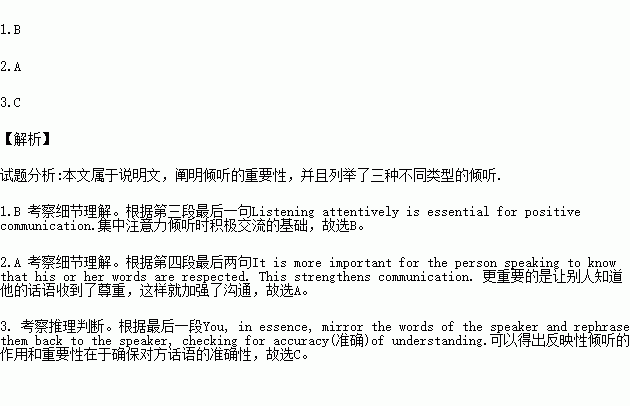题目内容
Listening, really listening, can improve communication and build respect with others. Communication begins by listening and then suggesting that you hear what the person is saying.
This can be recognized by focus or eye contact, body language, and reflective listening.
Focus (Eye Contact)—Focus means that you are looking directly at the person speaking and not looking off to one side or continuing to do something else. You are focused on what is being said; the speaker is the center of attention. Listening attentively is essential for positive communication.
Listening Without Interrupting—Does your body acknowledge(承认) that you are listening? Use smiles, nods, and expressions of understanding to communicate to the speaker that you are listening. It is not necessary that you agree or disagree at this time. It is more important for the person speaking to know that his or her words are respected. This strengthens communication.
Reflective Listening—Reflective listening involves hearing the feelings and meanings of the speaker. It is a re-statement (in different words) of what the speaker said. You, in essence, mirror the words of the speaker and rephrase them back to the speaker, checking for accuracy(准确)of understanding. This process affirms the speaker, indicates a respect of the person, and shows that you understand the speaker’s message. Through careful reflection of the speaker’s words, you can make clear the message and build mutual(相互的) understanding. Through reflective listening and the careful exchange of words, we learn that other people have important feelings and opinions which we need to consider. Learning to understand the importance of all ideas, not just our own, can lead to successful resolution of problems and mutual respect.
1.The best way to build respect with others is _____.
A. to look directly at the person speaking
B. to listen to the speaker attentively
C. to interrupt the speaker when necessary
D. to use expressions of understanding
2.What strengthens communication with the person speaking?
A. Making him or her know that his or her words are respected.
B. Expressing agreement or disagreement in time when listening.
C. Repeating his or her words from time to time.
D. Listening instead of saying anything.
3. Reflective Listening is aimed to _____.
A. show you are not absent in mind
B. make sure the speaker’s words are correct
C. checking for accuracy of understanding
D. express your own ideas without delay

